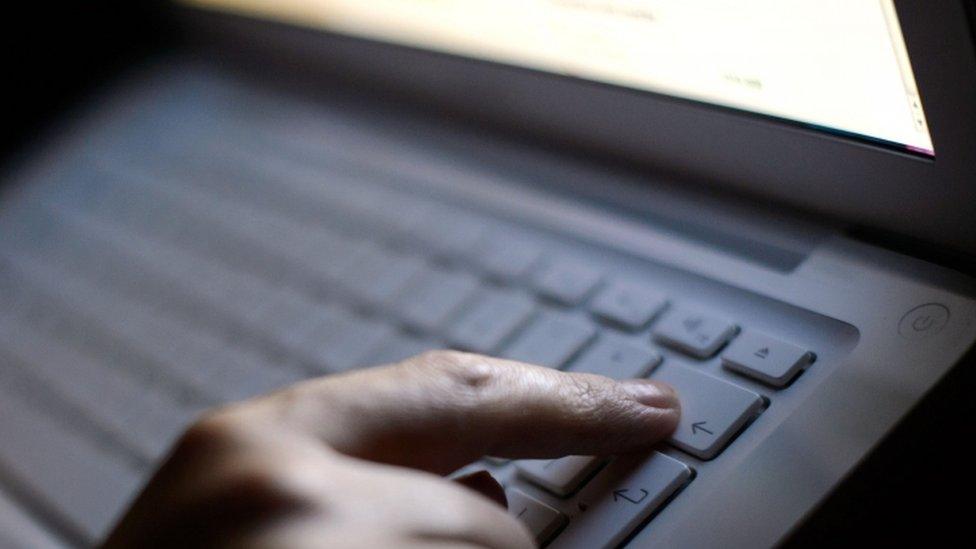Bank fraud: ‘I had £9,000 stolen from my account’
- Published

Mark Wheeler was scammed out of £9,000
When a caller claiming to be a bank fraud investigator told Mark Wheeler there were suspicious transactions on his account, he was naturally alarmed.
But the "investigator" was a crook and the call led to £9,000 being stolen from the 62-year-old's account.
When he reported the incident to his bank, its initial response was good but it quickly turned sour, he said.
He's one of several fraud victims who claim to have been given little support from banks, consumer group Which? says.
It reported that some victims struggled to contact their bank after they had been a victim of a scam, including one HSBC customer who waited a total of seven hours on hold, racking up a £50 phone bill.
"Fraud can have a devastating impact on victims," said Jenny Ross, Which? Money editor.
"When banks fail to offer proper support, it can make a nightmare situation even worse, and an absence of information from firms about how people can protect themselves could even lead to ruthless scammers striking for a second time."
The group has called for the payments regulator to introduce a mandatory reimbursement scheme for all payment providers, to ensure that customers are treated fairly and consistently when applying to get their money back.
Penalty charge threat
Mark Wheeler was left reeling by the call from the "bank fraud investigator".
When he was asked if he still had his bank cards, the Richmond man realised that his wallet had been stolen from his jacket.
To be reimbursed he needed to enter his card PIN on the phone, he was told.
He did as requested but the caller then stole Mr Wheeler's money.
"My account was suspended pending investigation, which I understood, but Lloyds refused to pay pre-existing standard orders and direct debits, causing me to be threatened with penalty charges," Mr Wheeler said.
The bank initially said it would not refund him but later backed down after it realised that branch withdrawals were made over the counter without the use of a PIN.
However, it refused to return £1,000 taken out from a cash machine until challenged by Which?.
A Lloyds Bank spokesperson said: "We have a great deal of sympathy for Mr Wheeler as the victim of a scam.
"We've considered the particular circumstances of the case and have refunded the outstanding amount.
"Your bank will never ask for your PIN number so see this as an immediate red flag that it's a scam."
'I was terrified'
In another case, Julie from Devon lost £3,900 after fraudsters posed as her bank.
She spent seven hours on hold on the phone to her bank, racking up a £50 phone bill. The process took so long that her landline provider temporarily cut her off.

Which? said it took four days until her bank, HSBC, contacted her after she had been scammed to tell her that she would be refunded.
She said: "I don't blame HSBC for the scammers, but it was completely inaccessible by phone.
"I was terrified because I didn't know what information the scammers had got… I didn't know whether they could get hold of my card details, or whether they could get something else from my laptop."
An HSBC spokesperson said: "We act with empathy and understanding when investigating a case and we work hard to ensure fair and reasonable outcomes for our customers, including providing them with appropriate information to help prevent future occurrences.
"We continually review our operations and always look for opportunities to better protect customers. We have recently made improvements to how fraud and scams can be reported, which means people can generally report a scam or fraud within minutes."

What to do if you become a scam victim
Call your bank directly, checking its website for the correct number to ring. If the fraud involved any of your personal information, consider signing up for a Protective Registration with fraud prevention organisation Cifas, external, which costs £25 for two years.
Change your passwords for any accounts that have been compromised due to fraud - and any that use the same password. Set up two-factor authentication wherever possible to provide another layer of protection.
Being scammed can take a huge toll on mental health. Mind, external and Victim Support, external have confidential helplines that provide support to consumers who have been hit.

Related topics
- Published30 July 2021

- Published29 July 2021

- Published24 March 2021
